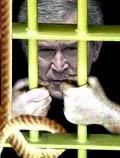| Find |
Friday, 18 January 2008
No Peace
To understand the failure of the president's trip to the Middle East, which is foreordained and doesn't have to be completed in order to fail, take note of two words that the president will not utter: "occupied territories."
Let's review the situation from the standpoint of international law. The West Bank, Gaza, the Golan Heights, East Jerusalem and a smidgen of Lebanon the Israelis still occupy are officially designated as occupied territories. They were seized in war. Jerusalem is officially an international city, so designated by the United Nations partition resolution that created the state of Israel. The Israelis, of course, long ago declared the resolution null and void.
As occupied territories, they fall under the Geneva Conventions. An occupying power is not allowed to take land or to build settlements in occupied territory. It is not allowed to destroy homes, to uproot olive groves, to deport people, and to wall the area off – all of which the Israelis have done and are continuing to do.
This brings us to the question of negotiations. It is impossible for the Palestinians, whose land is occupied and whose lives are totally controlled by the most powerful military state in the Middle East, to make any concessions. To make a concession, you have to have something. They have nothing. They have no power. They don't control their land, their borders, their access to the sea or the air, the water or even their movements within the territories. Thanks to the American vetoes, they don't even have any recourse in the U.N.
The only party, then, that can make concessions is Israel, and Israel is not making any concessions, since it far prefers land to peace with an enemy that is virtually powerless.
Therefore, if the U.S. refuses to pressure Israel, there will be no peace. President Bush's trip is nothing more than a public-relations ploy to simulate an interest in peace. Bush is, however, unwilling to say or do anything that might actually result in Israeli concessions and therefore in peace. In fact, the main purpose of Bush's visit is to harangue the Arabs about the alleged dangers of Iran. He refuses to talk to the elected representatives of the Palestinians, who are Hamas members.
I see no change in Bush's thinking, if you can call it that, at all, but I do notice that he looks depressed. The last two public appearances I've watched on television show an unhappy man. The old cockiness and the silly smiles seem to have vanished. It could be that slowly the news is trickling into his brain that his administration has been a flop.
In the meantime, the Palestinians continue to suffer, the world continues to ignore their suffering, and the kettle that is the Middle East continues to simmer. It is never wise for either an individual or a country to believe that because it is powerful today it will always be powerful. The Middle East is an open-air museum of the ruins of past conquerors.
We Americans should pay particular note to the fact that time is not reckoned in the Middle East as it is in the West, where it was shaped by industrial factory life. There is an Arab story about a man who returned to his village after an absence of some weeks.
"Do you remember that man who insulted me 30 years ago?" he asks a friend. "Well, I just killed him."
"Why were you in such a hurry?" his friend asks.
It's quite a sad situation for everyone concerned. If I were an Israeli, I'd be concerned about forcing another generation of Palestinians to live in poverty and bitterness. I'd be concerned that another generation of Israeli children is going to have to grow up in a militarized state in the midst of a larger population that hates them. As an American, I'm concerned that cowardly politicians are putting Americans at risk out of fear of a domestic lobby.
Charley Reese [[send him mail] ] has been a journalist for 49 years.
![[Zionazis-1.jpg]](https://blogger.googleusercontent.com/img/b/R29vZ2xl/AVvXsEg_x8DOGucgHQmfJJujuK_oYJdxhEnskhQqt-Og7lSk52HeaDQYzW8NQWfdpHmPgj_FJN0jJ3tz1prR1jVZHdHky2HDQxxcs4LVxX0DtAt3fG0sfRr6MDx7Sz8cJNjl0k0RS9TbCjangQ/s1600/Zionazis-1.jpg)




